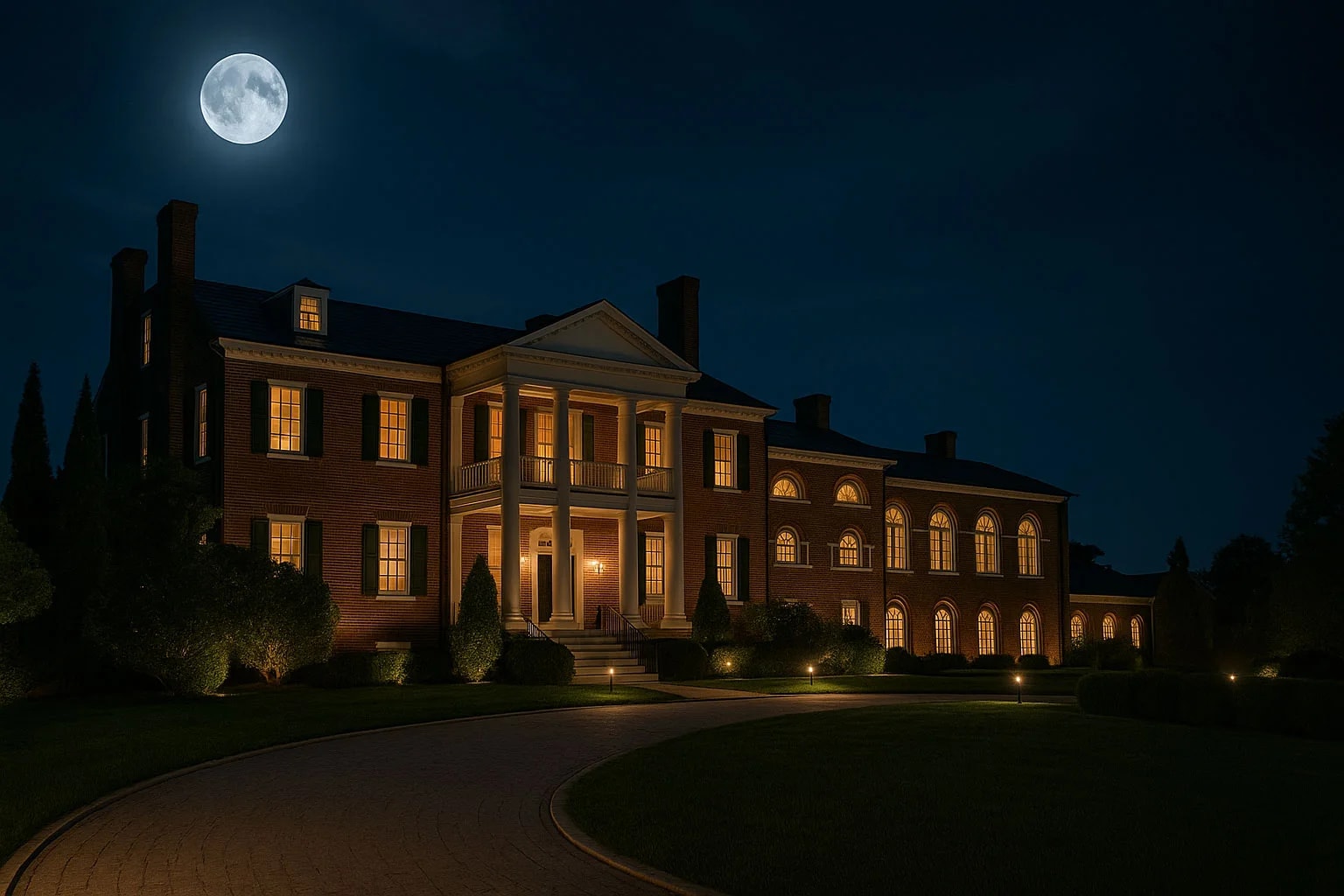Did You Know?
- Isaac Franklin commissioned Fairvue Plantation in the early 1830s.
- Isaac Franklin was a sadistic slave trader.
- Fairvue Plantation is haunted by the Fairvue Curse.
- Fairvue Plantation is now a private residence.
Is the Fairvue Plantation Haunted?
Because of the atrocities it bore witness to under Franklin's rule, a string of unfortunate events and paranormal activities have haunted the property since Franklin's residence. Over the years, there have been reports of many spectral sightings in the main house at Fairvue and on the surrounding grounds.
In a recent episode, the Southern Ghost Stories podcast detailed these supernatural occurrences, including the ghost of a young girl, believed to be Victoria Franklin, sightings of a Union soldier, a blue light that races across the property at night, and strange happenings in the developments built in the fields where the slaves of Fairvue once lived, worked, and died.
What haunts this historic estate?
The Fairvue Curse
Soon after Franklin and his wife made Fairvue their home, a long string of misfortunes began at Fairvue. He and Adelicia had four children — Victoria, Adelicia, Emma, and a son named Julius Caesar — all of whom died in early childhood. Some say that his children's deaths were a karmic repercussion of his cruel treatment of Lucinda and their son.
After Franklin's death and Adelicia's remarriage, the mansion stood vacant for some time. During the Civil War, Union soldiers occupied the house and used it as a barracks and hospital. Many men died while being treated in the main house, and at least one soldier wrote his last will inside one of the books in the Fairvue library using his own blood. After the war, the plantation was sold several times, and the new owners experienced both unlucky and supernatural happenings during their time there.
After Charles Reed, a horse breeder, purchased the property, he suffered an estimated $400,000 in pregnancy losses. During a bad storm one night, lightning set one of Reed's barns on fire, destroying the structure entirely and killing 28 of his horses. Was this the Fairvue Curse?
The Ghost of Victoria Franklin
The Wemyss family, who lived at Fairvue at the beginning of the 20th century, spoke about hearing a girl's voice in various parts of the main house and seeing a little girl wandering throughout the house, sometimes touching people who she caught unawares and then disappearing. The girl is rumored to be the ghost of Victoria Franklin, Isaac and Adelecia's daughter who died in the house at the age of six.
The Union Soldier
The Wemyss family also recalled seeing a man in the uniform of the Union army, restlessly roaming about upstairs in the main house at night. He was once spotted waving down Mr. Wemyss after his wife fell into the old ice house on the grounds. Mr. Weymss saw a soldier waving frantically at him from near the ice house, and when he went to investigate, he discovered his wife trapped and crying. Meanwhile, the soldier was nowhere to be seen.
The Racing Blue Light
Legend says that one night while the Franklin family still lived at Fairvue, a young servant boy was sent out in the night to run an errand for the family. He was carrying a lantern and running across a field when he tripped into a well and died. Since then, locals in Gallatin have claimed to see a mysterious blue light racing across the property at night and then suddenly disappearing without any explanation.
Disturbances in the Development
Later, Fairvue was sold off in pieces due to the financial troubles of Charles Reed. Much of the old grounds and the site of the old slave quarters have been turned into neighborhoods with million-dollar homes, apartment complexes, a golf course with a luxurious clubhouse, and several shopping centers. Since the construction began, paranormal events have plagued the area, from unexplained orbs of light to shadowy figures in photos taken on the grounds, to strange noises, to disappearing tools on construction sites, and more.
The country club especially has been a hotbed of spiritual energy, with sightings of multiple ghostly forms including a woman in a flowy, white dress stalking throughout the clubhouse at night, security alarms triggered for no apparent cause, and reports of glasses flying off of the bar and chairs moving independently.
Who is Isaac Franklin?
Born in 1789 in Sumner County, Tennessee, Isaac Franklin was one of ten children born to James Franklin and Mary Lauderdale. After working in his older brothers' shipping business for some time as a young man, traveling between Nashville and New Orleans often, Isaac began slave trading in 1810.
In 1828, he and his nephew James Armfield founded Franklin and Armfield, which grew to be one of the most profitable and powerful slave-trading firms in the United States.
In "The Troubled Legacy of Isaac Franklin: The Enterprise of Slave Trading," Robert Gudmestad details Franklin's legacy as a slave trader. Gudmestad writes how Franklin often led hundreds of slaves shackled together in a coffle on a torturous march from Alexandria, VA, to Natchez, MS. Those marches were bloody and vicious; the feet of the enslaved were bruised and blistered, and the men were often beaten along the way. The women suffered a worse fate, as Franklin and the other men overseeing the marches would frequently and repeatedly rape them during the long journey.
Unscrupulous, Franklin made no secret of his treatment of the slaves in his care. Edward E. Baptist discusses Franklin's misdeeds in "'Fancy Maids," and 'One-Eyed Men,'" examining Franklin's rape and commodification of those that he trafficked. Franklin's letters to his business partners and friends make many mentions of the "fancy maids" he and others traded amongst themselves, each brutalizing the light-skinned women who they trapped as house servants. Franklin would later throw the bodies of enslaved people into the swamps surrounding Natchez. Franklin was cruel, brutal, and barbaric.
Franklin's firm acquired and sold some 1,200 slaves each year, transporting them from their headquarters in Virginia into the deep South cotton states.
The Founding of Fairvue
Franklin built Fairvue Plantation in the early 1830s and spent close to $10,000 furnishing it to reflect his status as one of the wealthiest men in America. After Fairvue, Franklin purchased six more plantations in Louisiana, including the infamous Angola plantation, now the site of a state-run maximum-security prison.
While raising grain and livestock at Fairvue to send to his other plantations further South, Franklin repeatedly raped a female slave named Lucinda who became pregnant with his child. Shortly before his marriage to Adelicia Hayes, the daughter of a respectable Nashville family in 1839, Franklin sold Lucinda and his biracial son so that his marriage and his new reputation as a planter could begin without any complications.
Fairvue Today
Today, the main house has been preserved as a private residence, but most of the surrounding buildings and land have been sold off and developed into luxury subdivisions, a golf course and private country club, apartment complexes, and shopping centers. Though the main house retains most of its pre-war splendor, the property that has not been sold off and developed into neighborhoods and businesses has been retained as a private residence.
The current owners do not seem interested in offering tours of the historic house. Visitors to the Gallatin area may still experience the supernatural presence of the souls that seem tethered to the site, unable to move on from the terrors they no doubt experienced there in life.

The Isaac Franklin Plantation, where the spirits of slavery's victims still cry for justice
